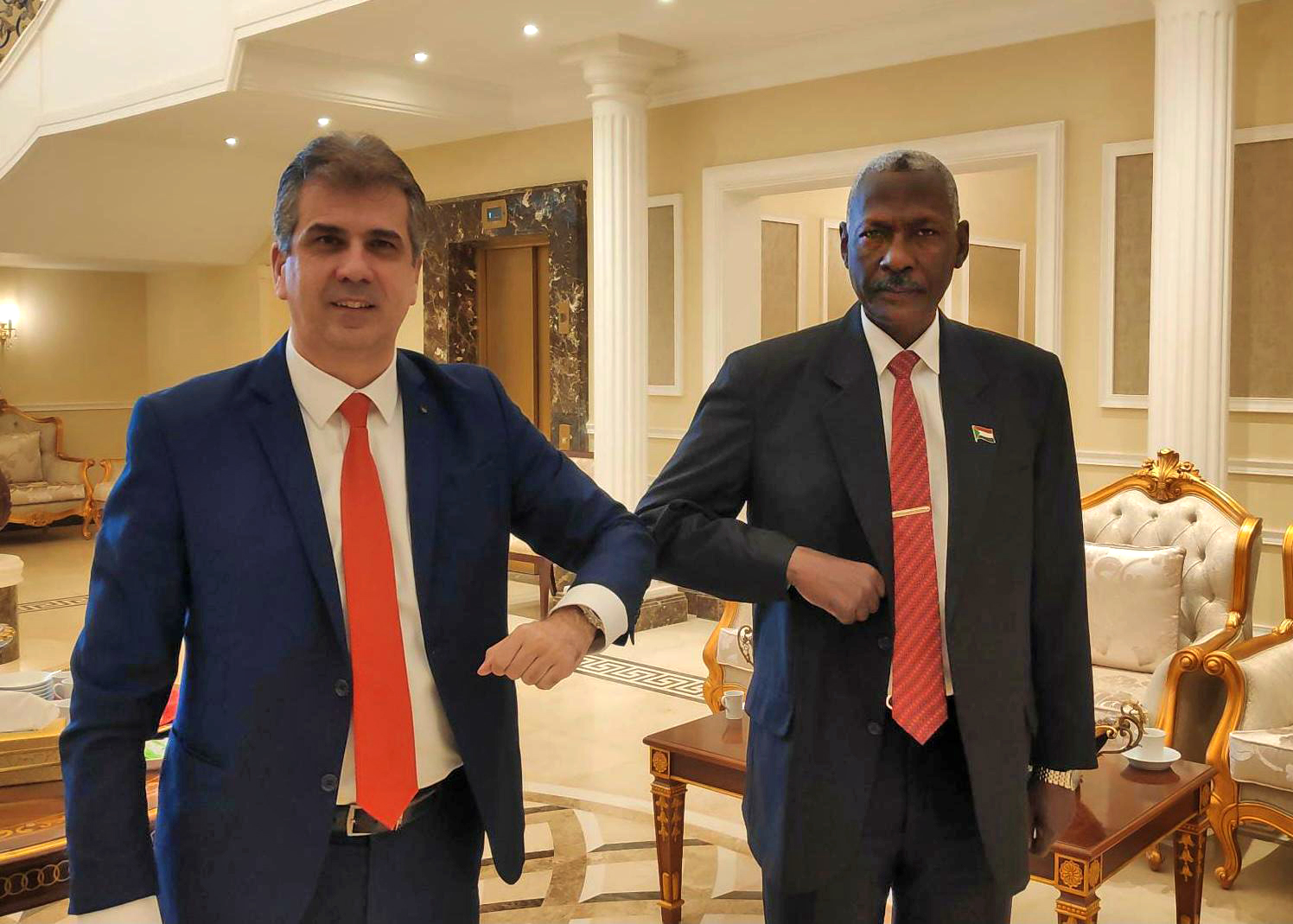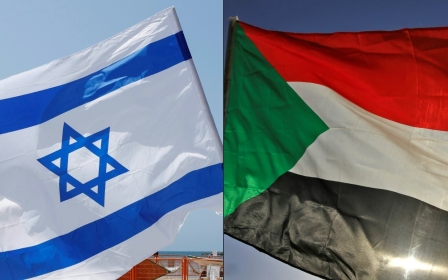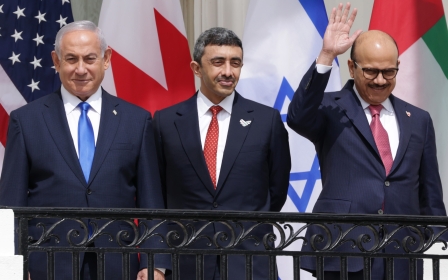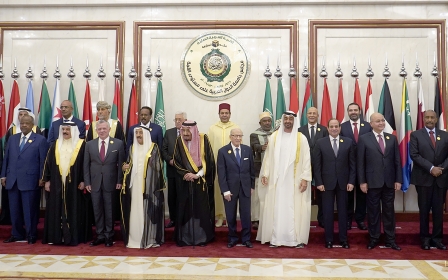Sudan-Israel: How pundits are grasping at straws to justify normalisation
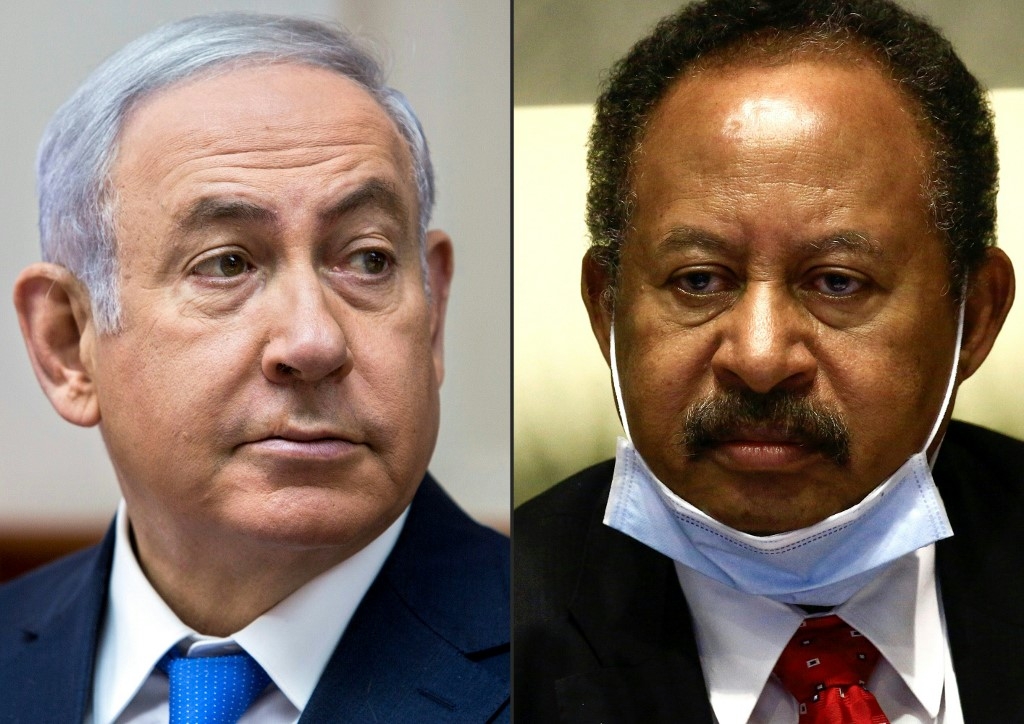
In a telling exchange of gifts in Khartoum on 25 January, Israeli Intelligence Minister Eli Cohen brought his host, Sudanese Defence Minister Yassin Ibrahim Yassin, citrus fruits and olive oil from Palestine, and received in return an imitation M-16 rifle, a product of Sudan’s Military Industry Corporation. The symbolism was clear: Tel Aviv delivered markers of its settler domination over Palestinian land and resources, and Khartoum responded with a weapon to consolidate the reality of Israeli occupation.
Cohen said he was captivated by the “warmth" of the reception in Khartoum, feelings that translated into a memorandum of understanding on security and intelligence cooperation “to work together to stop terrorism and exchange defence strategies and knowledge”.
Cohen also discussed with the Sudanese head of state, Abdel Fattah al-Burhan, the possibility of Israel joining the Red Sea alliance, a new security and defence bloc launched by Saudi Arabia last year. The bloc includes Sudan, Djibouti, Somalia, Eritrea, Egypt, Yemen and Jordan, and officially seeks to secure the Red Sea corridor from piracy, smuggling and regional threats, Saudi Arabia’s standard coding for Iranian interests.
Immediate reward
Earlier in January, the Sudanese government quietly signed the “Abraham Accords”, a normalisation deal with Israel, while maintaining that a final decision on the matter would rest with a still nonexistent transitional parliament. The immediate reward from the deal was a US commitment to provide Sudan with a bridging loan to help clear its arrears to the World Bank and access $1bn in annual funding.
New MEE newsletter: Jerusalem Dispatch
Sign up to get the latest insights and analysis on Israel-Palestine, alongside Turkey Unpacked and other MEE newsletters
The US formally rescinded Sudan’s designation as a “state sponsor of terrorism” in December, after the Sudanese government agreed to establish relations with Israel and to pay $335m to victims of the 1998 bombings of US embassies in Kenya and Tanzania and the 2000 bombing of the USS Cole off the coast of Yemen. The Sudanese government, however, remains liable for potentially billions of dollars in additional payments to the families of those killed on 9/11.
Sudan’s military-security establishment seeks normalisation with Israel as the surest doorway to the benefits of the mighty and their technologies of oppression
The transitional government in Khartoum, burdened with an economic tailspin, was for all practical purposes strong-armed into acquiescing to Washington’s quid pro quo, irrespective of mandate or domestic concerns. The mightiest country on Earth boxed a much poorer nation into political subservience.
And yet, there were willing partners in Khartoum; hence the warmth of Cohen’s reception in the Sudanese capital. Sudan’s military establishment had already openly declared its agenda with the surprise meeting between Burhan and Netanyahu in February 2020 in Entebbe, Uganda. At the time, politicians with the Forces of Freedom and Change, the civilian arm of the ruling coalition, denied prior knowledge of the meeting.
Significantly, a media campaign was unleashed to sing the merits of “normalisation”. Pundit after pundit, including sheikhs, came forward to market the case for peace with Israel, as it were. Their arguments can be summarised in three main points: one intrinsic and another extrinsic to Sudanese affairs, and between them a racial excuse to disqualify the Palestinian cause altogether.
Powerful patrons
Realpolitik, it is maintained, obliges Sudan to pursue “normalisation” with Israel in order to satisfy the demands of the US and its powerful patrons in the region, primarily Saudi Arabia and the UAE. This position is presented as a long-overdue awakening to Sudan’s strategic interests and an instance of “independent” national decision making.
Further, it is argued that the consensus of the 1967 Khartoum summit - no recognition of, and no negotiations or peace with Israel - is a relic of a bygone age. The frontline states of Egypt and Jordan long ago made their own separate peace deals with Israel, and the Palestinians themselves signed deals cementing Israeli domination over their lives, thus aborting their own cause.
The first argument rests on the assumption of a uniform body politic - an assumption designed to overwrite the conflicting interests, political biases and pursuits in any society. What is claimed to be a strategic interest of the nation is in fact a cover for brute authoritarianism: Sudan’s military-security establishment seeks normalisation with Israel as the surest doorway to the benefits of the mighty and their technologies of oppression.
Indeed, once Sudan’s realists had joined the Abraham Accords, the US military began phasing in an agenda of cooperation and exchange, with US Africa Command senior leaders recently in Sudan to discuss “strategy”.
On 24 February, an expeditionary fast transport ship of the US Military Sealift Command arrived in Port Sudan, in what was hailed as a “moment of fundamental change in the bilateral relationship between the United States and Sudan”. On 2 March, jubilant Sudanese navy officers welcomed the USS Winston Churchill, a destroyer of the US Sixth Fleet, in Port Sudan.
If regional examples are anything to judge by, however, the umbrella of the US military is not a conducive environment for the democratic will of a people to thrive.
Circuits of power
The second argument conflates the Palestinian people under the Israeli occupation with the long expired princes of Oslo (the Palestinian leadership). It is these circuits of power that Sudan’s realists aspire to plug into. The rationale of “the Palestinians did it too” is particularly unsustainable when presented as an indicator of an independent Sudanese political will.
In that regard, the Palestinian cause has now been weaponised as a bone of contention in the politics between Sudan’s now defeated Islamists and their adversaries.
One common line of reasoning is that Sudan’s Islamists wish to maintain the policy of boycotting Israel while their patrons, Qatar and Turkey, cultivate relations with Israel.
It is thus claimed that Sudan’s conversion to the axis of Israel, the US, Saudi Arabia and the UAE is evidence of Sudan’s emancipation from Arab hegemony over its political choices. In this imaginative twist of logic, Saudi Arabia and the UAE are but well-wishers, paving the way for Sudanese emancipation.
The complement to these two arguments is a loud Freudian slip. Some proponents of peace with Israel maintain that Palestinians are unworthy of solidarity, since they perceive the Sudanese as their racial inferiors - wannabe Arabs of African stock.
What goes unspoken in this logic are the experiences of Sudanese asylum seekers in Israel, some of whom have been hunted down by racist mobs in Tel Aviv, chanting the slogan “The people want the Sudanese deported”.
A Likud member in the Knesset stated candidly: “The Sudanese were a cancer in our body.” As talks among Khartoum, Washington and Tel Aviv were under way, Israeli media reported that the normalisation deal would involve plans to repatriate some 6,000 Sudanese asylum seekers currently in Israel.
The forces dictating their choices
Paradoxically, for the purposes of their new agenda, Zionists are happy to recognise Sudan as an Arab country. After a joint phone call last October with US and Sudanese leaders, Netanyahu declared: “Today we announce another dramatic breakthrough for peace. Another Arab state joining the circle of peace. This time, it’s normalisation between Israel and Sudan.” Netanyahu asserted triumphantly that Khartoum had said “yes to peace with Israel, yes to recognition of Israel and yes to normalisation with Israel”.
Strategic interests, the Oslo Accords and racial categories should be recognised as alibis aiming to strike at the idea of solidarity, caricature the possibility of liberation and denigrate the emancipatory potential of a people under occupation.
Sudan’s rulers would be better served by simply recognising the forces dictating their political choices, rather than conjuring up arguments that fly in the face of the revolutionary potential of the popular will that sustains their day in power.
The views expressed in this article belong to the author and do not necessarily reflect the editorial policy of Middle East Eye.
Middle East Eye delivers independent and unrivalled coverage and analysis of the Middle East, North Africa and beyond. To learn more about republishing this content and the associated fees, please fill out this form. More about MEE can be found here.



